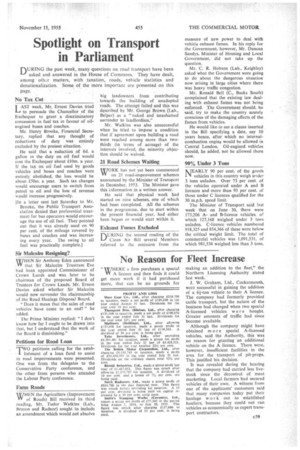Spotlight on Transport in Parliament
Page 197

If you've noticed an error in this article please click here to report it so we can fix it.
DURING the past week, many questions on road transport have been asked and answered in the House of Commons. They have dealt, among otla.lx matters, with taxation, roads, vehicle statistics and denationalization. Some of the more important are presented on this page.
No Tax Cut LAST week, Mr. Ernest Davies tried to persuade the Chancellor of the Exchequer to grant a discriminatory concession in fueltax in favour of oilengined buses and coaches.
Mr. Henry Brooke, Financial Secretary, replied that any thought of reductions of duty was entirely excluded by the preSent situation, He said that a reduction of 6d. a gallon in the duty on oil fuel would cost the Exchequer about £10m. a year. If the tax on oil fuel used by goods vehicles and buses and coaches were entirely abolished, the loss would be about £50m. a year. Such tax changes would encourage users to switch from petrol to oil and the loss of revenue would increase progressively.
[In a letter sent last Saturday to Mr.
• Brooke, the Public Transport Association denied that preferential treatment for bus operators would encourage the use of oil fuel. They pointed out that it was already used on 90 per cent. of the mileage covered by buses and coaches and was increasing every year. The swing to oil fuel was practically complete.]
Sir Malcolm Resigning?
WHEN Sir Anthony Eden announced VV that Sir Malcolm Trustram Eve had been appointed Commissioner of Crown Lands and was later to be chairman of the proposed Board of Trustees for Crown Lands, Mr. Ernest Davies asked whether Sir Malcolm would now surrender the chairmanship of the Road Haulage Disposal Board.
"Does it mean that the sales of road vehicles have come to an end?" he added.
The Prime Minister replied: "I don't know how far I ought to be drawn into that, but I understand that the work of the Board is diminishing."
Petitions for Road Loan
TWO petitions calling for the estab lishment of a loan fund to assist in road improvements were presented. One was from the delegates to the Conservative Party conference, and the other from persons who attended the Labour Party conference.
Farm Roads
WHEN the Agriculture (Improvement VV of Roads) Bill received its third reading, Mr. Tudor Watkins (Lab., Brecon and Radnor) sought to include an amendment which would not absolve big landowners from contributing towards the building of unadopted roads. The attempt failed and this was described by Mr. George Brown (Lab, Belper) as a "naked and' unashamed surrender to landlordism."
Mr. Watkins was also unsuccessful when he tried to impose a condition that if agreement upon building a road were reached among more than twothirds (in terms of acreage) of the interests involved, the minority objection should be waived.
21 Road Schemes Wailing WORK has not *yet been commenced on 21 road-improvement schemes announced by the Minister of Transport in December, 1953. The Minister gave this information in a written answer.
He said that physical work had started on nine schemes, one of which had been completed. All the schemes in the programme, due to start within the present financial year, had either been begun or would start within it.
Exhaust Fumes Excluded nURING the second reading of the Clean Air Bill several Members referred to the omission from the
measure of new power to deal with vehicle exhaust fumes. In his reply for the Government, however, Mr. Duncan Sandys, Minister of Housing and Local Government,did not take up the question.
Mr. C. R. Hobson (Lab., Keighley) asked what the Government were going to do about the dangerous situation now arising in large cities where there was heavy traffic congestion.
Mr. Ronald Bell (C., Bucks South) complained that the existing law dealing with exhaust fumes was not being enforced. The Government should, he said, try, to make the country acutely conscious of the damaging effects of the fumes from vehicles.
He would like to see a clause inserted in the Bill specifying a date, say 10 years hence, after which no internalcombustion engine would be allowed in Central London. Oil-engined vehicles should, he added, not be allowed there now.
90% Under 3 Tons NEARLY 90 per cent. of the goods vehicles in this country weigh under 3 tons unladen. Over 73 per cent. of the vehicles operated under A and B licences and more than 93 per cent. of those under C licences qualified for the 30 m.p.h. speed limit.
The Minister of Transport said last week that on June 30, there were 173,206 Aand B-licence vehicles, of which 127,168 weighed under 3 tons unladen. C-licence vehicles numbered 918,325 and 854,366 of these were below the critical weight limit. The total of commercial vehicles was 1,091,531, of which 981,534 weighed less than 3 tons.
































































































































































































































































































